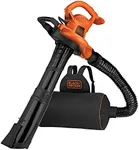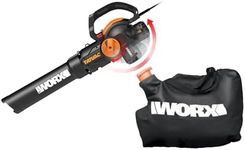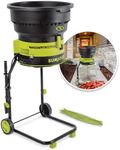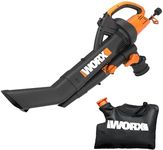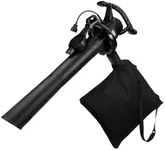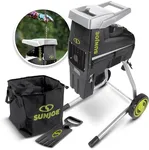Buying Guide for the Best Leaf Shredders
Choosing the right leaf shredder can make yard work much easier and help you manage garden waste efficiently. The best approach is to think about the size of your yard, the amount and type of debris you need to process, and how often you plan to use the shredder. Understanding the key features will help you match a shredder to your needs, making your purchase more satisfying and effective.Power SourceLeaf shredders are typically powered by electricity or gas. Electric models are quieter, lighter, and easier to maintain, making them ideal for small to medium yards and lighter debris. Gas-powered shredders are more powerful and suitable for larger yards or heavier, tougher materials, but they are noisier and require more maintenance. Consider how much mobility you need and the type of debris you’ll be shredding to decide which power source fits your needs best.
Shredding CapacityShredding capacity refers to the maximum amount and size of material the shredder can handle at once. Smaller capacity models are great for leaves and small twigs, while higher capacity machines can handle thicker branches and larger volumes. If you mostly deal with dry leaves, a lower capacity is sufficient, but if you have lots of branches or wet, heavy material, look for a higher capacity shredder.
Reduction RatioThe reduction ratio tells you how much the shredder can reduce the volume of debris. For example, a 10:1 ratio means it can turn ten bags of leaves into one bag of mulch. A higher reduction ratio is useful if you want to minimize waste or create mulch for your garden. If you have limited space for storing debris or want to compost efficiently, a higher reduction ratio is beneficial.
PortabilityPortability is about how easy it is to move the shredder around your yard. Some models have wheels and handles, making them easier to transport, while others are heavier and more stationary. If you need to move the shredder frequently or have a large yard, look for a lightweight model with sturdy wheels. For smaller spaces or if you plan to keep the shredder in one place, portability may be less important.
Noise LevelNoise level is an important consideration, especially if you live in a neighborhood with noise restrictions or prefer a quieter working environment. Electric models are generally quieter than gas-powered ones. If you are sensitive to noise or want to avoid disturbing neighbors, check the noise ratings and opt for a quieter model.
Ease of MaintenanceEase of maintenance refers to how simple it is to clean and care for the shredder. Electric models usually require less maintenance than gas models, which need regular oil changes and fuel management. If you prefer a low-maintenance tool, look for models with easy access to blades and minimal upkeep requirements.

